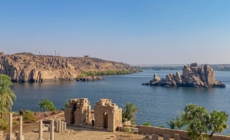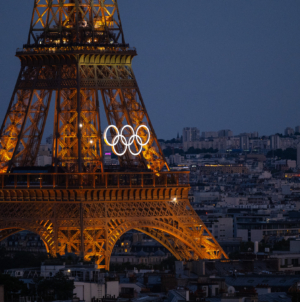-
Olympics News: Best Moments From the Opening Ceremony - 3 mins ago
-
Opening Ceremony Misses the Boat - 5 mins ago
-
Harvey Weinstein’s Medical Condition Takes Massive Turn - 39 mins ago
-
Vivian Jenna Wilson, Elon Musk’s Transgender Daughter, Says He Was ‘Cruel’ and ‘Uncaring’ - 49 mins ago
-
How to Watch Men’s Basketball at the 2024 Paris Olympics: Streams, Schedule - about 1 hour ago
-
Trump, Honing Attacks on Harris, Casts Her as a Far-Left Threat - 2 hours ago
-
Woman Explains Why She Decided To Have Rescue Dog Euthanized Over Behavior - 2 hours ago
-
Justice Dept. Defends TikTok Law That Forces App’s Sale or Ban - 2 hours ago
-
Archaeologists Find Ancient Egyptian Artworks Hidden Below Nile Waters - 2 hours ago
-
Trump Warns of Vote Rigging, Asks Christians to Vote ‘Just This Time’ - 3 hours ago
Today’s Arab League Is an Indispensable Partner for Peace
The 33rd Summit of the Arab League will take place in Manama, Bahrain this Thursday. Many Middle East watchers in the United States consider the League be an organization that has struggled to live up to its promise since its founding in 1945. Today’s Arab League, they argue, is like so many other large regional and international organizations: a disparate grouping of members with conflicting agendas who are only able to reach agreement on the lowest common denominator.
Pointing to the Abraham Accords, these critics tout a new paradigm whereby individual states, rather than collective action, can transform the region. They see in the decisions by Bahrain, the United Arab Emirates, and Morocco to normalize relations with Israel a new, state-by-state path to peace. Saudi Arabia’s reported moves to normalize relations with Israel through the United States as part of a new regional security arrangement lends further credence to this approach.
It’s true that there are now multiple Arab leaders who have demonstrated the vision to think outside the box and the courage to take risks for peace. Yet there are nevertheless constraints on how far they can go without the collective consensus of other members, and the Arab League remains an indispensable player in any comprehensive peace agreement.

Alex Wong/Getty Images
However much critics may discount it, the Arab League matters to the Arab states. The members believe in it and care about its outcomes. For all the talk about differences and divisions among them, the idea—or perhaps ideal—of Arab unity remains a powerful force from which citizens and rulers alike draw strength.
The League’s sanction confers legitimacy, and for this reason, a lasting resolution of the Palestinian-Israeli conflict is not possible without its endorsement.
The good news is that today’s Arab League differs quite considerably from its previous incarnations. The organization’s agenda is no longer driven by actors whose interests and ideologies are antithetical to the West. Instead, the political and diplomatic balance of power has shifted in favor of a new generation of leaders in Saudi Arabia and the Gulf, along with Egypt. They are pragmatic capitalists and clear-eyed realists with eye-popping ambition. They believe that without a settlement of the Palestinian-Israeli conflict, war will continue to wrack the region and prevent the full realization of their visionary futures. And they are prepared to use the full weight of their considerable economic and political power to achieve an agreement that is acceptable to both Israelis and Palestinians.
Perhaps most important from the American perspective is the fact that the overwhelming majority of the region’s leaders are committed to working hand-in-glove with the United States to achieve this goal.
Bahrain is leading the way with the region’s first bilateral comprehensive economic and security agreement. Together with other Abraham Accords signatories, we have achieved an unprecedented level of governmental and private sector cooperation in defense, trade, tourism, and investment. Last month, regional allies joined efforts to intercept Iranian missiles and drones breaching their airspace, en route to Israel. Meanwhile, Egypt and Qatar have been unstinting in their efforts to secure the release of Israel’s hostages.
Gone from multilateral Arab fora are the anti-Western diatribes that were once a regular part of the proceedings. The few outliers that remain, regimes sanctioned by the international community, and the spoiler roles they once played have been coopted or neutralized by the League’s more progressive members. We are heavily invested in a peaceful regional future and determined to exorcise the ghosts of the past.
This will only be possible, however, if all of us—the Arabs, the Israelis, and the West—work together with common purpose.
As a responsible, forward-looking, pro-American partner, Bahrain will certainly do its part. In hosting this year’s Arab League Summit, much has we have done throughout our modern history, Bahrain will be a resolute and forceful advocate for dialogue, tolerance and compromise. Bahrain’s leader and summit host, His Majesty King Hamad bin Issa Al Khalifa, has been traveling to major Arab capitals in a bid to ensure that this year’s gathering produces an outcome of substance that contributes positively to peace-making efforts.
We want to prove the critics wrong and to show the world that the Arab League is on the right side of history. If the past seven months have taught us anything, it is that the old way of doing things will not suffice. We must chart a new path forward, and an Arab League fit for purpose is an essential part of that reality.
His Excellency Shaikh Abdallah bin Rashid Al-Khalifa is Ambassador of the Kingdom of Bahrain to the United States.
The views expressed in this article are the writer’s own.
Uncommon Knowledge
Newsweek is committed to challenging conventional wisdom and finding connections in the search for common ground.
Newsweek is committed to challenging conventional wisdom and finding connections in the search for common ground.
Source link



















